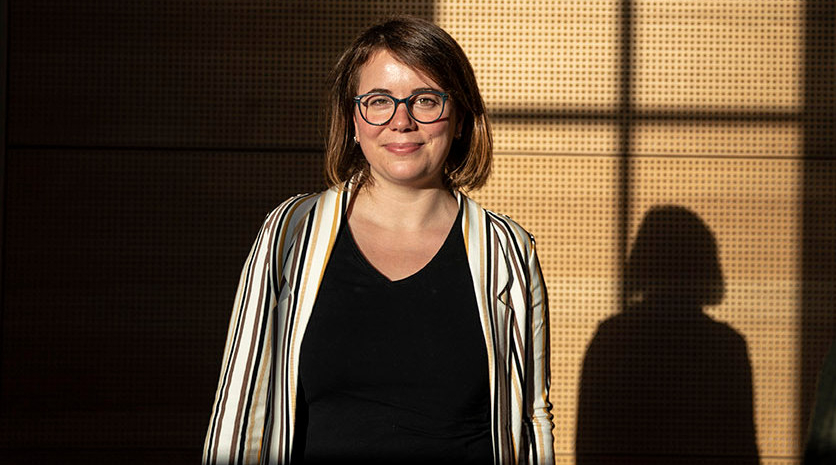Opportunities for better after-care after an ICU stay

Every year, between 60,000 and 80,000 people are admitted to an intensive care unit (ICU) in the Netherlands. If there is no proper after-care, recovery can take a long time. Almost half of the patients admitted to the ICU for two or more days still experience symptoms a year after their discharge. These are the findings of research carried out by Lise Beumeler, a researcher at the UG/Campus Fryslân and the Medical Centre Leeuwarden (MCL), for which she will be awarded her PhD in Leeuwarden on 9 March.
Beumeler examined which patients are at risk of long-term health problems and also how they can recover in a meaningful way. In this respect, the role of nutrition and the possibilities of virtual reality were investigated, among other things.
Marathon
An admission to the ICU is drastic. Beumeler: ‘Being discharged from intensive care is similar to reaching the finish line of the first marathon you run. But recovery can take much longer: almost 50% of patients who have been in ICU for more than two days are still not their old selves after a year.’ Over the past decade, the goal of care after ICU admission has shifted from being ‘pure survival’ to ‘meaningful recovery’. Nevertheless, Beumeler's research shows that almost half of the people admitted to the ICU for two or more days have not recovered sufficiently, physically and mentally, within the first year after discharge. In her thesis, she describes ways to identify patients who may be at risk of long-term health problems after staying at an ICU. For them, a stay at the ICU can result in a decrease in quality of life, higher healthcare demands, disrupted work participation, and a higher burden on the patient’s immediate environment.
Nutrition and e-Health
Although dietary and exercise guidelines are in place, Beumeler found that almost no patient was able to get enough energy and protein (to build muscle mass) from food. This may explain why patients are unable to recover significantly on their own and why previous rehabilitation programmes show no or insufficient effect. In her dissertation, Beumeler also discusses the feasibility and safety of using virtual reality training during and after ICU admission as part of a more individually tailored rehabilitation. In collaboration with Leeuwarden-based company 8D Games, she investigates how ‘serious gaming’ can help patients to recover.
A gap in the care pathway
There is no organized after-care in the Netherlands for former ICU patients or their loved ones, which means that they fall between the cracks. ‘There is a clear gap in the care pathway. Up until now, nobody took responsibility for their rehabilitation,’ Beumeler explains. ‘Because there is no case management during this pathway, patients lack a central point of contact and often end up seeing different medical specialists for health problems that might be related to their ICU admission. This is why we are now setting up after-care for the Northern Netherlands, as part of which we are teaming up with knowledge institutions, patients, informal carers, students, and healthcare providers across the region.’ In the future, Beumeler sees opportunities for combined accessible after-care, designed with and for patients and informal carers, facilitating both individual and e-Health rehabilitation options. ‘However, we can only achieve this if partners, such as health insurers, municipalities, and the Province, are willing to shoulder their responsibilities with us.’
Curriculum vitae
Lise Beumeler studied Biomedical Sciences at the University of Groningen, where she became interested in clinical research with a participatory approach. In 2018, she began her research as part of a collaboration between the Medical Centre Leeuwarden (MCL) and Campus Fryslân to improve recovery after serious illness in the Frisian region. Together with colleagues from the ICU after-care clinic, she also set up the first ICU café in the Northern Netherlands. Currently, Beumeler works as a senior researcher at MCL and as a postdoctoral researcher at UG/Campus Fryslân.
| Last modified: | 02 March 2023 4.08 p.m. |
More news
-
02 April 2024
Is more data always better?
Xiaoyao Han researches the added value of Big Data and explores how the accumulation of data enriches our scientific understanding
-
29 January 2024
Sustainable behaviour? Information alone is not enough
As a social and environmental psychologist, Josefine Geiger looks into what motivates people to act in environmentally friendly ways. According to her, if we manage to overcome the barriers we sometimes perceive, an individual could have a lot of...
-
15 January 2024
Autonomous weapons lower threshold to war
Killer robots? Self-firing drones? There is a strong suspicion that an autonomous weapon system is already in use in Libya. However, regulation is still lacking. PhD student Taís Blauth studies the legal and ethical questions raised by these...
